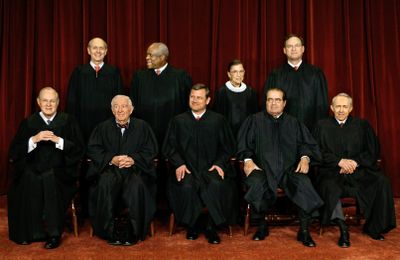New court season begins
Docket likely to focus on business cases

WASHINGTON – A business-friendly Supreme Court will start another season Monday on familiar turf.
With a closely watched case involving cigarette advertising, Chief Justice John G. Roberts Jr. will resume the corporate focus that’s marked his three-year tenure. The cases may not sound sexy, but they can be crucial for companies and consumers alike.
“The question,” noted Robin Conrad, the executive vice president of the National Chamber Litigation Center, “comes down to who gets to regulate business.”
So far, the Supreme Court has agreed to hear some 41 cases for the 2008-09 term, which begins on the traditional first Monday morning in October. The National Chamber Litigation Center, the increasingly active litigation arm of the U.S. Chamber of Commerce, has identified at least 16 of these as business cases.
The court typically hears about 75 cases each term, and some of the most important disputes may not have matured yet. The justices will continue adding cases through early next year.
Unlike recent years, the court hasn’t yet scheduled a Guantanamo Bay or obvious national-security case, though they might yet arise. The culture war issues, including abortion, bandied about by presidential candidates are nowhere to be seen yet, although there’s one case involving dirty words on television. Other high-profile disputes, including all-but-certain legal challenges to the new $700 billion financial bailout package, remain dormant.
“It’s going to take a while (for the bailout law) to get to the Supreme Court,” former Solicitor General Paul Clement predicted.
The pending business interests, meanwhile, revolve around high-dollar, dry-sounding issues such as pre-emption.
The term’s inaugural case, for instance, called Altria Group v. Good, will determine whether federal authority freezes out consumers from challenging cigarette advertising in state courts. A similarly themed case, Wyeth v. Levine, centers on state vs. federal authority over drug labeling.
The facts can be gruesome. Vermont resident Diana Levine lost her right arm below the elbow after the allegedly unsafe injection of a medicine. The implications may be sweeping. Nearly 30 groups – ranging from the California Medical Association to Democratic Sen. Dianne Feinstein, of California, and Democratic Rep. Debbie Wasserman Schultz, of Florida – have filed friend-of-the-court briefs, known as amici curiae, in Wyeth.
“This case may win the amici sweepstakes for this term,” joked David Vladek, a law professor at Georgetown University Law Center.
The pre-emption theme surfaces in different ways, though the core principle remains the same. As Conrad put it: Who gets to regulate?
In Altria, for instance, three Maine residents claim that the manufacturer of Marlboro Light and Cambridge Light cigarettes – the firm more commonly known as Philip Morris – deceptively advertised the cigarettes as essentially safer. The tobacco company and business allies including drug manufacturers argue that a federal cigarette-labeling law blocks smokers from taking action under state deceptive-practices laws.
Every Supreme Court term contains a surprise or two, but handicappers already are predicting some likely winners and losers. Count business among the probable winners. In the past two terms, the U.S. Chamber of Commerce has prevailed in 21 out of 31 cases in which it’s filed briefs.
“This is a court that feels comfortable with business,” said lawyer Beth Brinkmann, who’s argued numerous cases before the high court.
Individual case winners also might be predictable. Next Wednesday, for instance, the justices will hear in Winter v. Natural Resources Defense Council a challenge that some label as the Pentagon v. whales.
The Navy’s 3rd Fleet wants to use mid-frequency active sonar for training exercises off the Southern California coast. Environmentalists contend that the underwater sonar emissions disrupt whales, dolphins and other marine mammals. The legal question, one being closely watched by timber companies, builders and others, is when “emergency circumstances” can overcome a court’s injunction.
In a wartime case coming out of the often-reversed 9th U.S. Circuit Court of Appeals, where a Navy victory is simultaneously a win for business interests, the odds appear set.
“For the whales, it’s not looking so good,” Georgetown law professor Lisa Heinzerling said.